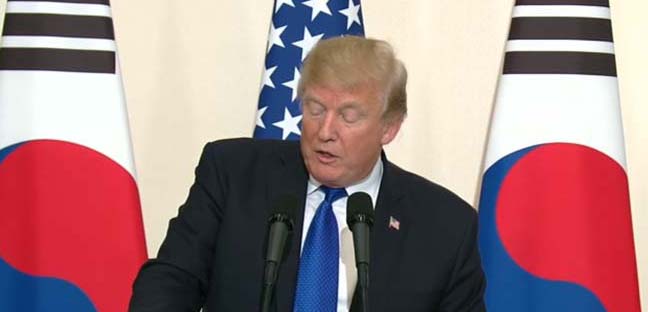
Trump's Chinese sojourn, styled as a "state visit plus," my Washington Post colleague David Nakamura noted, "opened with the tour of the ancient Forbidden City, a reminder of China's 5,000 years of history. The Trumps also were treated to performances by the Peking Opera, including scenes from 'The Monkey King' and 'A Tipsy Beauty.' " Trump also played a video of his granddaughter, who is studying Mandarin, singing a song for "Grandpa Xi."
Trump has made quite a show of his personal rapport with Xi, who spent a weekend with the president this year at his Mar-a-Lago resort in Florida. Last month, as Xi had his name and philosophy enshrined in the Communist Party's constitution - raising him to the stature of towering figures such as Mao Zedong and Deng Xiaoping - Trump congratulated his Chinese counterpart on his "extraordinary elevation."
While Trump may admire political strength when he sees it, it's unusual for an American president to cheer the ruthless consolidation of power by an autocrat at the helm of a repressive one-party state. No matter: Trump reiterated the message ahead of his arrival, hailing Xi's "great political victory" as if it were some democratic contest.
Despite the apparent friendliness of two of the world's most powerful people, they have obvious and intractable differences. The two big issues hovering over their meetings will be the looming threat of a nuclear North Korea and Trump's other bugbear, the yawning U.S. trade deficit with China.
On the former, Trump appears to have laid down his cards. The hard-line speech he delivered before the South Korean National Assembly on Wednesday poured scorn on Pyongyang. "North Korea is a country ruled as a cult," he said. "At the center of this military cult is a deranged belief in the leader's destiny to rule as parent-protector over a conquered Korean Peninsula and an enslaved Korean people."
Later in the speech, Trump gave North Korea a sharp warning: "Do not underestimate us," he said. "And do not try us."
"This speech made the 'axis of evil' speech look friendly," John Delury, a professor of international relations at Yonsei University in Seoul, said to my colleague Anna Fifield, referring to President George W. Bush's infamous 2002 State of the Union speech. "That sent a signal to Pyongyang that the Americans are not open to changing their relationship with North Korea and that the president was deeply hostile and ideologically hostile to them."
It's not just a matter of sending tough messages to the North Koreans - who quickly dismissed Trump's remarks as the ravings of a "mad dog." Trump and hawkish figures within his camp see China as both the problem and the solution to addressing North Korea and have long insisted that Beijing do more to squeeze its otherwise-isolated neighbor.
"To those nations that choose to ignore this threat or worse still, to enable it, the weight of this crisis is on your conscience," Trump said in Seoul.
But no matter how hard Trump will try, it's emphatically clear that the Chinese don't see eye-to-eye with the Americans. Although they have no affection for North Korean despot Kim Jong Un, they fear both the chaos that the collapse of Kim's regime could create as well as the prospect of a unified, pro-American Korea on its doorstep. While they are increasing economic pressure on Pyongyang, they are unlikely to cut off the spigot to any extent that would provoke genuine instability. Instead, China advocates a diplomatic track that could lead to negotiations, although potentially with conditions to which neither the United States nor its regional allies may be inclined to agree.
"There are big differences in the way of thinking between the United States and China on North Korea," Yang Xiyu, a former Chinese Foreign Ministry negotiator on North Korea, said to the New York Times. "Trump thinks of North Korea too simplistically - that if China cuts off the oil, the nuclear issue will be solved."
On trade, China will give Trump the useful headlines he seeks. The White House is expected to announce lucrative deals between U.S. and Chinese companies that could be worth as much as $250 billion, according to Bloomberg News. But it's not expected to win to any real Chinese concession on the larger structural concerns surrounding the trade imbalance between the countries.
"China's willing to sign trade deals all day long, as long it stays away from industrial policy and the sort of market-access issues that they're seeking to avoid," Christopher K. Johnson, a China expert at the Center for Strategic and International Studies, said at a panel discussion last week.
"Even if Xi and Trump sign import and investment agreements, as anticipated, Trump's demands will do little to either reduce the trade deficit or restore American jobs (which have largely been lost to automation, not to China)," Mira Rapp-Hopper wrote in Foreign Affairs.
China's interests lie elsewhere. Under Xi, Beijing is keen on rebranding from its perceived status as a rising nation in a part of the world long dominated by the United States to an equal member in a "great power relationship."
"I don't think anybody would be able to contain China," Cui Tiankai, China's ambassador to Washington, said to reporters ahead of Trump's trip. "President Xi has always said that the Pacific Ocean is large enough to accommodate the development of both China and the United States."
But that worries China's neighbors, who see its assertiveness in the neighborhood as a sign of things to come. On Friday, Trump will address a regional meeting in Vietnam and is expected to rebuke China for its military moves in the South China Sea. No cuddly state visit will be able to obscure the tensions there.
Previously:
• 09/18/17 Angela Merkel is going to win reelection. That may not be good
• 11/23/16 Iran's atomic chief says he doesn't think Trump will scrap the nuclear deal
• 06/20/16 Donald Trump may like Putin's latest remarks about the US
• 03/31/16 Al-Qaida offers its analysis of the US election
• 03/04/16 Russian man could go to prison for saying the Divine is a myth
Comment by clicking here.


 Contact The Editor
Contact The Editor
 Articles By This Author
Articles By This Author
